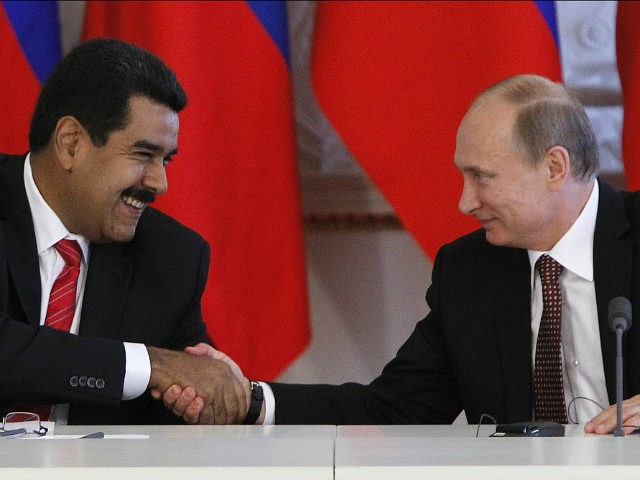“America for the Americans” was a fundamental piece of the foreign policy of the United States in relation to Latin America since President James Monroe announced it in 1823, when his country lacked the resources and military to enforce it vis-à-vis imperial European powers.
Today, however, the nation, which has become the world’s leading power, seems not to be interested in applying it in the face of the growing presence and influence of Vladimir Putin’s Russia in Venezuela. In fact, fifty years after the missile crisis, Russia has returned to seek its place in the Americas. Cuba is no longer its center of interest. Now it is Venezuela, converted since the Hugo Chávez era into Russia’s strategic ally thanks to its extraordinary mining and oil wealth – and especially thanks to its geographic location close to the United States. Moscow has found the exploitation of this relationship especially easy, as Chávez’s Venezuela has been subordinated to the political and military tutoring of Cuba, Russia’s old ally.
Russia not only exercises power over Venezuela’s oil industry but also in the operations of the refining company of the Venezuelan State CITGO in the United States, which processes 4 percent of the refining of that country’s production. To achieve this, it acquired 49.9 percent of the company through its oil company Rosneft.
While it is true that this new reality has raised concerns in the United States Congress, what seems to go unnoticed is that the Russian challenge to the Monroe Doctrine is not only in the oil control of Venezuela, which it shares with China, Venezuela’s main creditor. The biggest and most dangerous challenge is to provide sophisticated war equipment to a narco-state, as is the current case of Venezuela.
Putin, knowing the criminal nature of the regime initiated by Hugo Chávez and continued by Nicolás Maduro, is undoubtedly complicit in a regime that, by its nature, represents a clear and imminent danger to international peace and security – not just for us Venezuelans.
Meanwhile, the United Nations Security Council, entrusted by its Charter with this responsibility, has been hijacked by two of its permanent members: China and Russia, who would even veto including the issue in their agenda. Even though the UN Secretary-General, in accordance with Article 99 of the UN Charter, could call the attention of the Security Council to the case of Venezuela, he does not seem inclined to do so.
This reality makes it unlikely that the United Nations will respond with the urgency demanded by the circumstance that one of its member countries has become, before the eyes of the world, a narco-state to such an extent that Venezuelan Vice President Tareck El Aissami has been sanctioned by the Secretary of the Treasury of the United States as an important drug trafficker and money launderer.
An adopted son, and a nephew of Nicolás Maduro, are being tried in New York court as drug traffickers. A significant number of generals have been included in the Clinton list of drug traffickers.
This being the reality of the Venezuelan tragedy, only the application of the Monroe Doctrine, associated with the most important group of countries in the region, The Lima Group, could evict the regime that has kidnapped Venezuela.
It is worth remembering that, since 1895, the United States intervened twice in Venezuela: the first time when President Grover Cleveland almost came to an armed conflict with England to prevent her from appropriating a territory in controversy with Venezuela in the British colony of Guyana; and the second, between 1902 and 1903, when President Theodore Roosevelt forced Germany, England, and Italy to lift the naval blockade that they had imposed on Venezuela to collect debts from its government.
It is true that the Monroe Doctrine, and especially its so-called “Roosevelt Corollary,” implied a kind of carte blanche for U.S. intervention in the region, but both interventions coincided on the one hand with the United States’ interest in enforcing its doctrine by the European powers, on the other with a defenseless Venezuela before the British Empire. This is the same situation today, as Venezuela is occupied by Cubans, Russians, and Chinese, while its own leaders are associated with the worst causes of humanity in terms of terrorism and drug trafficking.
In the current circumstance, the President of the United States could add his own “Trump Corollary” to the Monroe Doctrine, stating that his government would share responsibilities with other governments of the region to prevent any country from becoming a narco-state like Venezuela.
In this sense, reading the intervention of President Cleveland before the Congress of his country could inspire and encourage the American president, who at one point declared that to get to put an end to the Venezuelan tragedy he did not rule out a military option.
Cleveland said: “Maintaining the Monroe Doctrine is vital for our people and our government, for peace and our security. There is no greater calamity for a great nation that equals that which means supine submission to injustice, and the consequent loss of dignity and national honor.”
Yesterday, the threat was the British Empire. Today, it’s Putin’s Russia.
Diego Arria has served as former Ambassador of Venezuela to the United Nations, former President of the UN Security Council, and former Governor of Caracas.

COMMENTS
Please let us know if you're having issues with commenting.